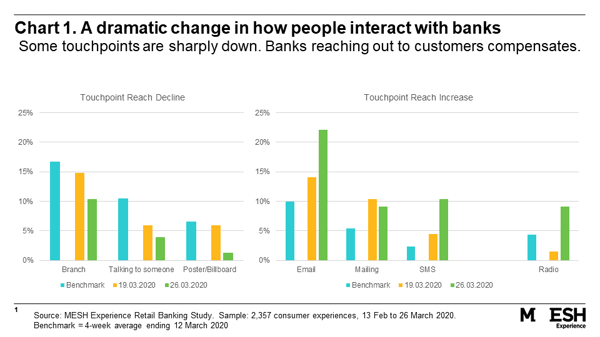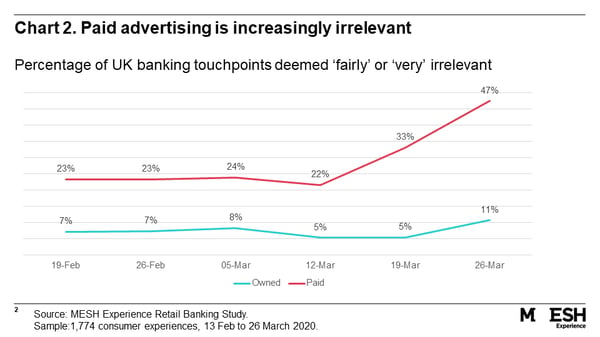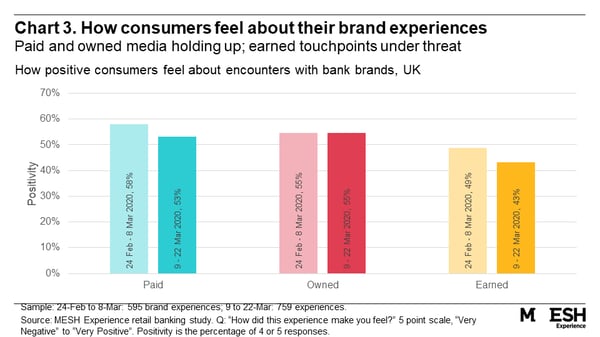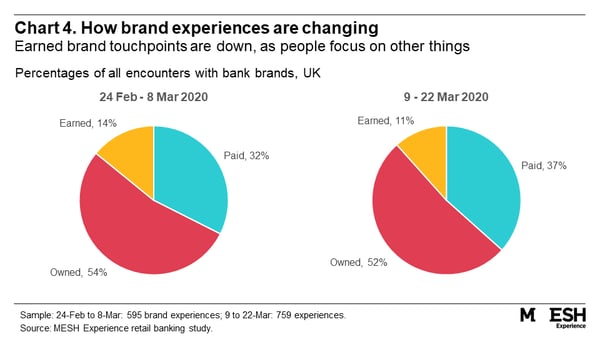-
In a societal crisis, what should marketers do?
CMOs have moved from grief to action over the last weeks as they grapple with the rapidly evolving pandemic. Only two weeks ago the ‘disaster’ facing CMOs was the sadness of not being able to air a new campaign that may have taken months to create.
“Meeting the needs of your customer at a profit”, the famous definition of marketing from Professor Philip Kotler, needed rethinking. What good is a highly paid celeb in your ad enticing people to buy your product, if your customers are losing their jobs and can’t pay to keep their homes?
For the last few years, talking about brand purpose has been in vogue. This crisis is a great test for brands to stay true to their purpose and values. How could these values guide decision-making?
To answer these questions, we’ve been talking to CMOs about what’s working. We’ve also been listening to customers. Four lessons are emerging.
First, let go of your brand campaigns. Most sales-focused messages will feel at best irrelevant – and at worst, downright insensitive.
The problem isn’t reach, but relevance. People are still noticing paid messages, albeit through different channels. Each week, insight agency MESH Experience asks a sample of UK consumers to report on all their encounters with bank brands during the week using a diary platform. This includes everything from ‘paid media’ (for example, TV and online ads) to ‘owned’ (e.g. using the firm’s website or app, and emails from the bank) and ‘earned’ (e.g. news coverage and social media mentions) experiences. As Chart 1 shows, the media mix is changing: with fewer people out and about, touchpoints such as billboards are obviously not noticed. But that’s compensated for by brands reaching out in newspaper and TV ads. That may well change in the coming weeks, of course, particularly in the many sectors where revenues are sharply down.

-
However, many of the paid ads that are still getting through seem irrelevant to consumers: see chart 2. Ads that people previously found at least amusing and perhaps persuasive now elicit reactions like “Just that ad again”, “Comedian telling a joke…irrelevant”, and “Man with a black horse”.

Rapidly-redesigned campaigns differ on how well they capture the moment. In the US, Hershey’s pulled its feel-good ads with hugs and handshakes on March 10th and replaced them with product-focused ads. In Brazil, a playful but well-intentioned redesign of the McDonald’s logo was hammered as opportunistic and rapidly withdrawn. A tweet encapsulated the mood: “Brands and agencies. Stop it.”
Another diagnosed the solution: “I don’t want your cute logo play McDonalds. I want you offering a million free meals to those in need.”
Banks, also, are under pressure to focus on customers’ urgent needs. On March 10th, several UK banks - TSB, NatWest/RBS and Lloyds - announced they would help customers with mortgage payment holidays and other measures. In the US we saw a different strategy. On March 17th Bank of America committed $100M in support of communities around the world impacted by the coronavirus, and only on March 19th was support offered to consumers and small businesses experiencing hardship. Ads through newspapers, in particular, are spreading the word on these measures.
These more service-oriented messages are mostly appreciated: “Entire page putting customers' minds at rest during the coronavirus regarding no fees for missed payments, payment holidays for mortgages and loans, access to fixed-term savings accounts and their scan cheque and payment facility” Reaction to Halifax ad in The Sun newspaper. So overall, consumer reactions to paid ads are only slipping a little (see Chart 3).

Consumers seem highly sensitive, though, to even a hint of self-interest in what firms do and say. “Interviews with business owners affected by Coronavirus outbreak. One lady cafe owner had approached HSBC for a loan while waiting for the £25k grant which had been promised to small business owners in the Budget and they simply offered her a loan at 18% APR...Annoyed that HSBC are making so much money in charges” Comment on BBC2 news item
All this illustrates the second lesson: to drive communications from your purpose. What consumers are demanding is that firms live up to the higher purpose statements they have all defined but, until now, not been forced to live by.
A good start is in how we communicate, and to what end. Of course, paid media are only one way of communicating, and indeed a minority of consumers’ brand experiences. In Chart 4, we’ve compared the 759 experience reports they’ve given over the last two weeks with the preceding two weeks.

-
An increasing proportion of owned experiences is made up of letters and emails to the firm’s customer base. Several personal messages from CEOs of companies severely hit by the crisis have stood out for their focus on the customer’s welfare, including some from Ed Bastian at Delta Air Lines and one from Arne Sorenson at Marriott International.
These messages are generally well-received: “The bank sent an email to customers saying it would do what it could to support those who may be affected by covid 19. It was helpful in explaining what we should do if we needed to contact the bank. Very supportive.” M&S Financial Services.
However, consumers are quick to judge communications that seem motivated by the firm’s problems and not their own: “It was a notification about covid 19 saying phone lines were busy and suggesting I do online banking….annoyed” Halifax, email. Overall, we see polarization in owned touchpoints, with both more highly positive reactions and more highly negative ones as the crisis has developed.
As for earned media, people’s attention seems mostly elsewhere: peer-to-peer touchpoints – the brand being mentioned when talking to a friend or on social media – are way down even from late February. Where firms do show up in the news, though, consumer reactions show an acute attention to firms’ motives. Many for-profits are used to talking to the markets primarily in financial terms, but even that is suggesting to consumers that they are not genuine in living up to their declared purpose of helping their customers’ lives: “Seems Standard Chartered has announced a larger than anticipated fall in profits due (it says) to the CoronaVirus Outbreak…Cynical.” Comment on CNN coverage.
Consumers were similarly cynical about the motives of retailer Sports Direct when it announced on 23 March that it would be resisting the UK government’s call for retailers to close, arguing that sportswear would help people exercise. CEO Mike Ashley’s argument was not helped by media coverage of online price hikes and allegations that warehouse staff with high-risk conditions would be sacked if they did not turn up for work. The backlash soon forced the firm to fall into line, but at a cost in highly critical earned-media coverage.
Third, innovate around your purpose. The initiatives consumers most widely applaud go beyond communications and payment terms to innovate around the firm’s purpose more broadly.
Examples are not hard to find. Spectrum offered 60 days free internet to help US students, now need to work at home. Verizon and Comcast made some on-demand viewing free of charge. In the UK the BBC, with its public service heritage, is providing a whole host of content offerings applicable for the times – not simply coronavirus updates, but educational programming for children, virtual church services, and Health Check UK Live for people in isolation.
Sports Direct’s clumsy spat with the government was not exactly contradicting its declared purpose. Its vision statement rather emphasizes its aspiration to be an international retail leader: motivational for the board, perhaps, but not for employees or customers. By contrast, the announcement by food-on-the-go baker Greggs that it would be closing branches ahead of the deadline on 23 March was well received - helped by its simultaneous announcement of help for those in hardship through its longstanding Greggs Foundation, and support for local communities through free food. By living its declared corporate values of being enthusiastic and supportive, these become brand values, too.
Finally, trust in the Force. What consumers demand from the private sector is clear: to put society’s interests first. Will this prove sustainable commercially? Academics have debated this for years. But CMOs have to take a view now. Many tell us they are backing their instincts: that investing in consumer trust will pay off in the long run. On March 14th, Hyundai and Genesis offered 6 months of car payments for those losing their jobs due to coronavirus. On March 16th Ford offered customers help with repayments, and replaced its vehicle ads with ads showing how the company helped during two world wars by creating planes and tanks. By March 19th Ford and General Motors were offering to make much-needed ventilators. It is noticeable that Hyundai offered support in 2009, when owners could return their financed purchases or leases within one year if they lost their jobs, creating considerable goodwill. Acting quickly, decisively and with a true sense of purpose can build long-term trust.
The financial markets seem to take that view. Trust is a particularly precious commodity in tough times, as consumers tend to switch to trusted brands when life feels risky. It is no surprise, then, that the differing approaches of Sports Direct and Greggs have been reflected in different market valuations. In the week from 23rd March to 27th March, a week in which London stocks were recovering somewhat, Greggs picked up by 9%, and Sports Direct’s competitor JD Sports was up 13%. Despite its CEO’s apology on 27th March, Sports Direct’s parent Fraser was down 3% on the week, and 40% on the month.
-
In the last decades, we can remember no moment when the private sector has come under such customer pressure to live up to their declared purpose of helping customers and society. If this mood continues, firms will need to move beyond integrated communications to holistic culture change, where profits are seen as enabling purpose rather than the other way round. Are consumers serious this time, or is this a passing moment? Time will tell.
Fiona Blades - President and Chief Experience Officer, MESH Experience
Shane Baxendale - VP, Data Science, MESH Experience
Hugh N. Wilson and Emma K. Macdonald are professors of marketing at Warwick Business School, UK

